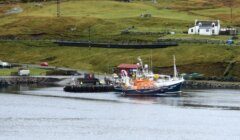Letters / Increased local powers key to progress on fixed links
Thank you for your report on SIC election candidates’ views about fixed links.
Sadly, despite colossal flows of oil money from Shetland for decades, national and devolved governments of all colours have failed to emulate Norway’s exemplary provision of modern transport links to its remote communities, also, exporting its technology to the autonomous Danish province, the Faroe Islands
Taking immediate advantage of its newly awarded local powers, Faroe started work in the 1950s and now boasts 22 tunnels, up to 11km in length. Several more are in the pipeline, the longest being 25km.
Seventy years on, perhaps, it’s time for Shetland – and Scotland – to step through the time warp into 21st century transport standards.
But where will the money come from?
Obviously, the Scottish Government could fund it and recoup the money from savings accrued by ending ferry operations on completed tunnel routes. Fine, provided they’re willing to pay and you can accept them calling the shots and deciding the timing.
Otherwise, Gary Robinson and Davy Sandison’s alternative of copying the highly successful Scandinavian method makes sense and has the obvious advantage of avoiding government indecision, interference and botching of contracts.
Whalsay Community Councillor William Polson has written repeatedly intimating that low-cost Norwegian government loans have been offered before, a possibility that would sit well within the abovementioned Scandinavian method.
Mr Robinson also said: “If the Scottish Government could be persuaded to keep their revenue funding for our ferries in-play after the new links open, then this would help to keep cost of the tolls down.”
Indeed. Unless the Scottish/UK governments are putting up the money, this will be essential. Otherwise, it will not happen. Tunnels cannot be paid for from user tolls alone, while government makes off with the isles’ ferry money.
If they are not supplying the capital funding, they must continue to pay the full annual and capital spending saved for the ferry routes in question, at least, until the borrowed capital has been repaid, when ongoing tunnel costs might reasonably be funded as part of the roads network.
The Greens’ idea of raiding the SIC’s reserve fund to pay for a service that should be provided by government is absurd and is, doubtless, the ventriloquising voice of the Scottish Government, on whose ‘laps’ the Green Party’s ‘top dogs’ sit, comfortably ensconced.
Alas, negotiation with the Scottish Government will be unavoidable. Despite promising “fair ferry funding” in 2013 (£5.5 million per year), it was withheld for eight years until 2021 when they finally agreed to pay up, following the SIC decision to pursue increased local powers, a move that instantly boosted its negotiating leverage.
Candidates have unanimously pledged to work for Shetland’s interests yet lamentably few mention the need for increased local powers, the very thing that can deliver all their hopes and aims.
This important policy must be sustained and actively pursued. Without it, the council’s negotiating position will be back to Square One and fixed links will remain a pipedream.
John Tulloch
Aberdeen













































































